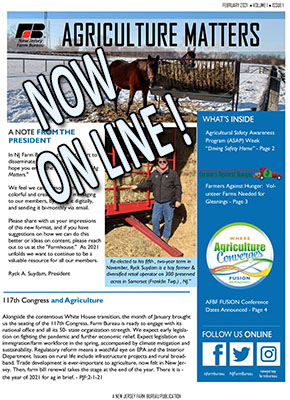
New Jersey Farm Bureau News
At Packed Highlands Hearing, Suspicion and Skepticism Run Deep
02 Jun 2016, Posted by admin in News, Science and Environmental Issues, State NewsN.J. Assembly approves $15 minimum wage bill
27 May 2016, Posted by admin in Economics and Prices, News, State NewsThe State Assembly voted to approve the $15 minimum wage bill by a vote of 42-31. Click here to read the full story from NorthJersey.com.
$15 minimum wage bill heads to N.J. Assembly for vote
24 May 2016, Posted by admin in Economics and Prices, News, State NewsChristie Says ‘No-Go’ on Open-Space Funding, Second Time This Year
24 May 2016, Posted by admin in News, Science and Environmental Issues, State NewsPRESS RELEASE: NJ Farm Bureau Opposes $15 Minimum Wage Proposal
16 May 2016, Posted by admin in Economics and Prices, News, State News***For Immediate Release***
NJ Farm Bureau Opposes $15 Minimum Wage Proposal – Cites Unique and Severe Impacts to Agricultural Industry
(Trenton) – New Jersey Farm Bureau, the state’s largest agricultural organization, opposes the $15 minimum wage proposal (S-15) heard in by the Senate Labor Committee today.
Farm Bureau President Ryck Suydam presented testimony as well as individual farm profiles showing the potentially devastating effects such a major increase would have on some New Jersey farms. “The immediate impacts of such a change for some farms would range from $100,000 up to $300,000,” said Suydam. “Because farmers are price-takers, not price-makers, they would be handcuffed by this – unable to pass along the state mandated cost increase.”
The impact of a large wage increase will have a greater impact on agriculture because farming is such a labor intensive business. In the farm profiles shared with the committee, the payroll share of farm expenses was 38%. A recent survey of the nursery sector of New Jersey agriculture shows that figure to be 40% of total farm expenses.
Other states, and previous New Jersey legislatures, have recognized agriculture’s uniqueness and treated the industry differently when it comes to minimum wage. “Seventeen other states have a separate agriculture minimum wage,” Suydam said, adding that most recently, New York state created a two-tier approach to their wage increase in recognition of the disproportionate impact to rural industries. The New Jersey Legislature itself provided a grant program in the 1990’s to help farmers cope with a minimum wage increase.
Suydam added, “New Jersey has a history of recognizing that farming is particularly vulnerable to certain policy initiatives and has developed special programs and rules to maintain and grow this $1.3 billion wholesale industry. This is yet another one of those situations.”
#
Contacts: Ben Casella or Ed Wengryn – 609-393-7163
Agritourism – An Unsung Economic Gem in NJ
11 May 2016, Posted by admin in Marketing and Promotion, News, State NewsThe Holdup on Open-Space Spending?
10 May 2016, Posted by admin in News, State NewsThe Holdup on Open-Space Spending? Christie Wants to Say Where Funds Go
Price Report for Hackettstown Auction April 12, 2016 Sale
28 Apr 2016, Posted by admin in Economics and Prices, NewsNJ Herald OpEd on the Highlands Septic Density Rule Proposal
24 Apr 2016, Posted by admin in News, Science and Environmental Issues, State NewsThe New Jersey Herald published an editorial (4-24-16) titled “Trying to make Highlands Act a bit more fair.” New Jersey Farm Bureau agrees wholeheartedly with this piece, and believes it’s worth a read.

